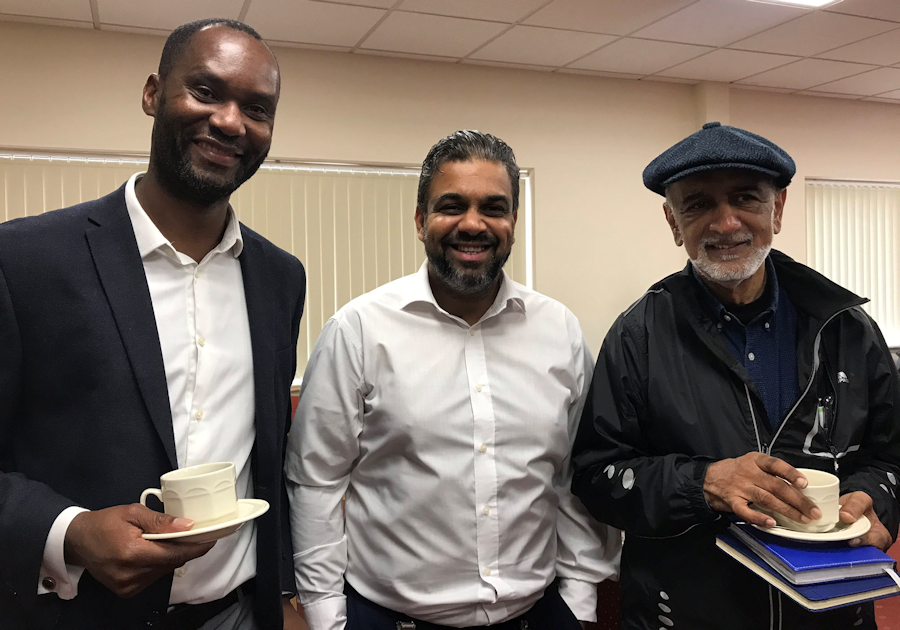We see the diversity of all communities and colleagues as a strength to help inform the way we plan, design and commission health and care services for people living across West Yorkshire.
 Equality is about making sure everyone is treated fairly and given an equal chance to access opportunities. It is not about treating everyone the same way. People may require different things to achieve similar outcomes.
Equality is about making sure everyone is treated fairly and given an equal chance to access opportunities. It is not about treating everyone the same way. People may require different things to achieve similar outcomes.- Diversity means ‘difference’. When used in the same context as equality, it’s about recognising and valuing individual as well as group differences. It also means treating people as individuals and placing positive value on the diversity they bring because of a protected characteristic or cultural background.
- Inclusion is about making all groups of people feel included and valued within their society or community. Where individuals or groups of individuals are excluded or feel on the margins of society there is often a direct impact on their health and wellbeing.
To make sure everyone can get the best out of health and care, we need to understand who our patients and service users are, and what their individual needs are, so when they access services, they get the right care and have the best possible experience.
We know health inequalities exist across West Yorkshire and that some patients, carers and services users have different access, experience and outcomes. We want to reduce those differences and remove them entirely where possible.
The NHS West Yorkshire Integrated Care Board is the organisation with overarching statutory responsibility for assuring equality, diversity and inclusion in health and care commissioning and provision for West Yorkshire.
These statutory duties include:
Equality Act 2010 and the Public Sector Equality Duty
The Equality Act 2010 protects people against discrimination, harassment and victimisation in relation to housing, education, clubs, the provision of services and work. It unifies and extends previous equality legislation. Equality is a legal principle to eliminate discrimination and promote equality of opportunity to people and groups.
The Public Sector Equality Duty (PSED) is made up of a general duty and specific duties. The general duty forms the main part of the legislation, and is supported by specific duties which support public bodies to demonstrate performance and compliance.
The public sector equality duty is described in Section 149 of the Equality Act and requires public bodies, including CCGs, to pay due regard to the need to:
- Eliminate unlawful discrimination, harassment, victimisation and any other conduct prohibited by the Equality Act 2010.
- Advance equality of opportunity between people who share a protected characteristic and people who do not share it.
- Foster good relations between people who share a protected characteristic and people who do not share it.
The Act explains that having due regard for advancing equality involves:
- Removing or minimising disadvantage associated with a protected characteristic;
- Taking steps to meet the needs of individuals who share a protected characteristic (where these are different from others); and
- Encouraging persons who share a protected characteristic to participate in public life or in any other activity where participation by that group of people is disproportionately low.
Protected characteristics are defined as:
- Age
- Disability
- Pregnancy and maternity
- Marriage and civil partnership
- Race
- Religion or belief
- Sex
- Sexual orientation
- Gender reassignment
Under the specific duties of the PSED we are required to:
- Publish information to demonstrate compliance with the general duty annually, including data on those with a protected characteristic who are affected by our policies and practices
- Publish one or more equality objectives covering a four-year period
To evidence ‘due regard’ as required by the Equality Act 2010 and to be sure that the decisions we take make a real, positive difference to the lives of people in West Yorkshire where a decision is being made about a potential change to a service, policy or activity an equality impact assessment (EIA) is completed.
Equality Delivery System (EDS)
The Equality Delivery System (EDS) is a toolkit designed by the Department of Health to help NHS organisations to improve the services they provide for their local communities, consider health inequalities in their local area and provide better working environments that are free of discrimination.
The EDS has four goals, with 18 specific outcomes. As part of the EDS process, NHS organisations engage with their patients, local voluntary organisations and their staff in order to grade their equality performance, identify where improvements can be made and act on their findings. The EDS goals are:
- Better health outcomes for all
- Improved patient access and experience
- Empowered, engaged and included workforce
- Inclusive leadership at all levels
The NHS England Equality Hub Webpage provides more detail about the Equality Delivery System.
Workforce Race Equality Scheme (WRES)
The Workforce Race Equality Scheme (WRES) requires NHS organisations to demonstrate progress against nine indicators of workforce equality.
Workforce Disability Equality Standard (WDES)
The Workforce Disability Equality Standard (WDES) is a set of ten specific measures that supports NHS organisations to compare the experiences of Disabled and non-disabled staff.
Accessible Information Standard for health and social care
The Accessible Information Standard establishes a framework so patients and service users (carers and parents) who have information or communication needs relating to a disability, impairment or sensory loss, receive accessible information and communication support when accessing NHS or adult social services.
Contribute to the future of equitable healthcare in West Yorkshire

The West Yorkshire Health and Care Partnership is crafting a new EDI for 2024.
Through surveys, stakeholder events, and focus groups, your insights will help shape a fair and inclusive healthcare system. You can read more about this initiative here.

